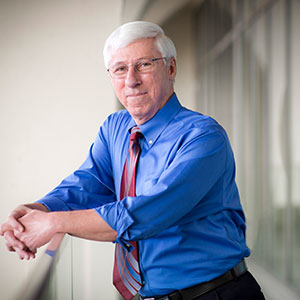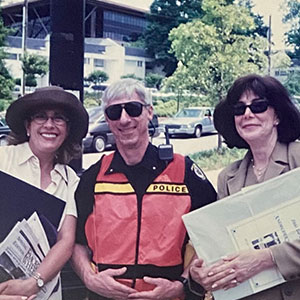Craig T. Watson, 45 years
Director, Clery Act Compliance
Campus Services

Tell us a little about the work you've done at Emory throughout your career.
I began my career at Emory as a police officer with the Emory Police Department on June 26, 1978. I remained with EPD for 41 years, serving as a line officer, a Sergeant / shift supervisor, Investigator, Lieutenant, Captain managing the Uniform Police Services Division, and then Chief of Police from 1995 to 2016. From 2016 to 2019, I served as the Assistant Vice-President for Public Safety, and in 2019 I moved into my current role as the Director of Clery Act Compliance. I have always believed that law enforcement is — and should be viewed as — a Customer Service profession with the members of the community as our customers. I appreciate the various opportunities I’ve had, both as a member of EPD and in a Clery Act compliance role, to help enhance the safety of the community so that community members may place their focus on the great achievements that have and will continue to be accomplished at Emory.
What are some of your favorite memories of your time at Emory?
- My first connection to Emory began in the late 1960’s. When I was about 10 years old, Horton’s Sundries was a drug store in Emory Village. My father was a salesman and Horton’s was one of his customers. We would drive through the campus on the way to Horton’s where I would help him bring stock up from their basement to restock the store shelves. The payment for my effort was getting a milkshake from the soda fountain / lunch counter in the store.
- Meeting my late wife, Cheryl, when she was a student in the Nursing School in 1976. Upon graduation, she went on to work as a nurse at Emory University Hospital and the Emory Clinic for many years.
- Being here in 1979 for the receipt of the original $100 million-dollar gift from the Woodruff Foundation that served to ignite the growth of Emory.
- Shaking then President Jimmy Carter’s hand when he participated in the ground-breaking ceremony for the construction of the Cannon Chapel and later serving as the liaison to his Secret Service detail while he served as a visiting professor.
- The Emory Village Fire in the winter of 1979 that destroyed a large section of the Village (the Village Theater and Stan’s Sandwich Shop were a total loss).
- Providing security for the 1995 visit of then sitting President Bill Clinton as he hosted a Southeastern Economic Summit on campus.
- Hosting the USA Women’s Gymnastics Team on campus during the 1996 Summer Olympics.
- Meeting the Dalai Lama during his visits to Emory.
- Being approached by an alum at a Commencement ceremony one year who walked up to me and said “I can’t believe you still work here”. He then told me that I had helped him with a serious problem he had while he was a student at Emory, and he had always been appreciative of that act. He then told me that he was here that day to watch his daughter graduate (yep, I felt old after that).

Leonard's mom is to the left of me!
- Bumping into the mother of a graduating Law School student several times during another Commencement ceremony and assisting her with various needs throughout the day. At the end of the day, she insisted on taking a photo with me and later sent me a framed copy of the photo which was signed “Leonard’s mom, Law School ’98”. I kept that photo in my office.
- Meeting my wife, Ann, who is a now retired 30+ year Emory employee (Director of Emory Photo/Video Services). She asked me out for coffee in 2013 and the next thing you know we were married in 2017.
What are some of the most significant changes you have witnessed over the course of your career?
The most significant change for me is the tremendous growth of the institution. When I started here, Emory was a small college that had a hospital. As Emory grew it became a University with a Healthcare system. Now it has grown into an internationally acclaimed research institution and award-winning Healthcare entity that truly has the ability to change lives for the better. The growth of the physical footprint of the University is also amazing. I have witnessed countless buildings replaced by newer facilities, only to then witness those facilities be replaced by even newer facilities (the hazards of having been here for so long). I am also proud of the tremendous effort that goes into ensuring that this growth is accomplished with a central focus on maintaining and supporting the environment.
Is there anything you miss from "back in the day"?
During my first several years at Emory, the only dining option was the cafeteria in Cox Hall. I would often be the only officer on duty on the evening shift and if I received an emergency call, I would leave my food on the table and run out the door. The staff working on the food line would see me leave and keep my dinner warm until I made it back. That was simply part of the culture and the kind of relationship that existed among all the employees at Emory. I believe that culture still exists, it’s just become a bit more difficult to exercise given the short-comings of the pandemic and the growth of ‘work-from-home’ opportunities. Despite the growth of the University, it’s still like a family. You do whatever you can to help each other.
What do you hope for the future of Emory?
Continued success in the development of the institution and student life; and continued investment to support the success of the individual faculty and staff, who are truly the heart of the institution.
Anything else you would like to share?
I’ve been blessed to work with many wonderful people during the past 45 years and I will always cherish those relationships.